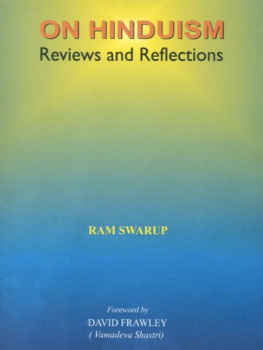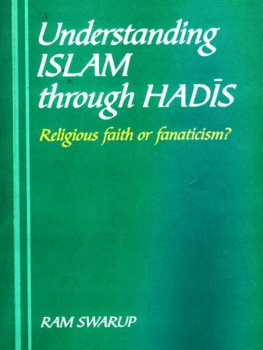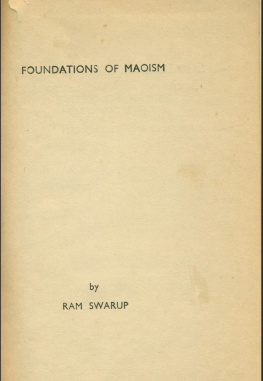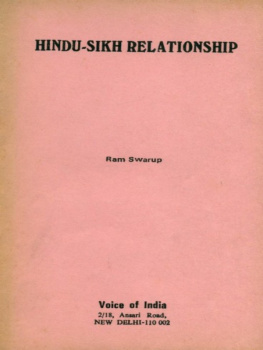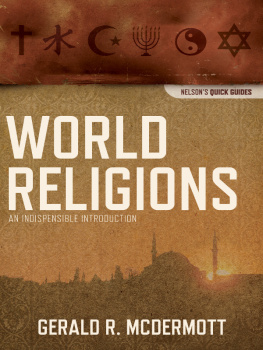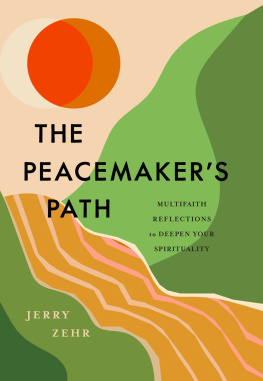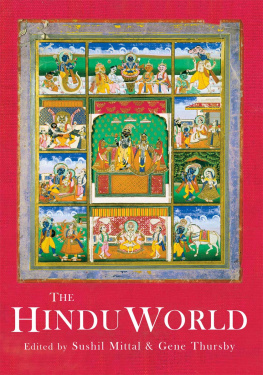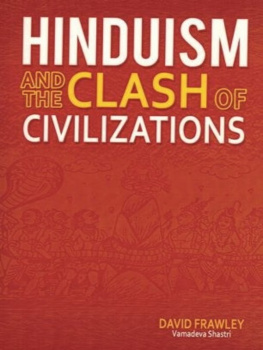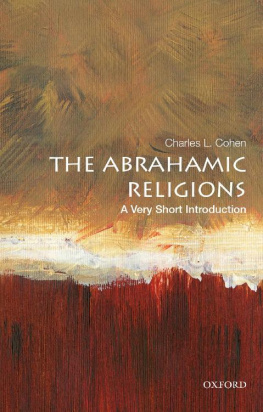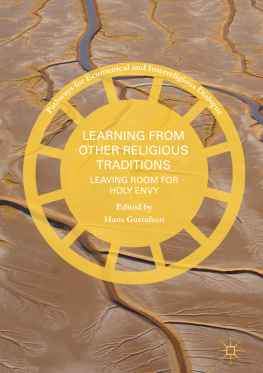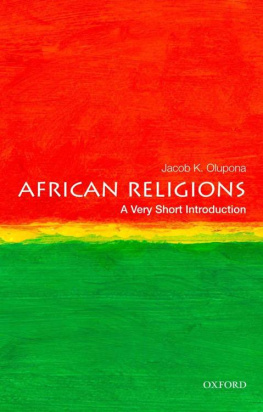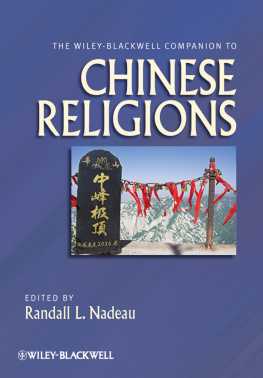Foreword The Reawakening of Dharmic and Native Traditions There are two major groups of religions in the world today. First are the conversion-based religions of Christianity and Islam. Each holds that it is the only true faith for humanity and solely represents God's plan and God's will. Both reflect an exclusivist ethos of One God, a single holy book, a final prophet or single savior, an historical revelation, salvation from sin, and heaven or hell as the ultimate resting-place for the soul. Christianity and Islam became the dominant religions of the Western world over the centuries through a long process of struggle and warfare, as they displaced, often cruelly, all other religions that came in their path. Both conversion-based religions are based on an older Jewish monotheistic tradition that was critical of the diverse Pagan cults around it. They turned this rejection, which for the Jews was meant to preserve their own culture, into an article of faith and a need to eradicate all other beliefs. The second major group of world religions are the dharmic or meditation traditions of India - Hinduism, Buddhism and Jainism - of which Hinduism is the oldest and largest. Chinese Taoism and Japanese Shinto have an affinity with these and can easily be placed among them. Dharmic traditions reflect a spiritual ethos of natural law (dharma), karma and rebirth, yogic practices, and a pursuit of direct experience of truth and self-realization through meditation. They became the dominant religions of the Eastern world, not through any process of intimidation, but by growing up organically with the cultures of these lands. Dharmic traditions define the Divine more as an impersonal and timeless consciousness than the personal Creator of Biblical traditions. They are tolerant and pluralistic and can accept other spiritual paths as valid and have no need to displace them. In addition there are various indigenous traditions and native creeds like those of the pre-Christian Europeans, the ancient Egyptians and Babylonians, and the many Native American, Asian, Pacific Islander and African groups. These appear more like the dharmic traditions of the East than the conversion-based religions of the West, which disdainfully call them pagans, heathens, kafirs or barbarians - the same terms that they use to characterize dharmic approaches. Like dharmic traditions these native ways have an experiential spirituality, ritual worship, use of images, multiplistic ideas of divinity, connection to the Earth and nature, and the recognition of a Great Spirit, though perhaps not as clearly defined as in dharmic paths. As the world has now moved out of colonial domination by monotheistic creeds, a new respect for Eastern dharmic traditions is arising everywhere. The impersonal consciousness of Indic traditions has much more in common with the universe as perceived by modern science than does the jealous God of the Bible and the Koran. Karma and rebirth make more sense to people than do heaven and hell for explaining the fruit of our actions. Yoga and meditation done on a personal level have become more meaningful spiritual activities than attending churches or getting involved in missionary efforts. Overall, a new era is dawning in which organized religion and institutionalized belief - the characteristics of conversion-based creeds - is being set aside in favor of diverse spiritual and cultural approaches that characterize the paths of dharma. As part of this process, a new awakening is happening in native traditions from a Celtic revival in Europe to a resurgence in the native religions of Africa. Even Anglo-Americans are looking to the Native American religion and its sweat lodges and vision quests - which their forefathers denigrated as the base superstitions of the Red Man - for a connection to life and nature that Christianity has failed to bring them. Many people see the need for religion to be connected to the land, to a people and to a culture, that is not a mere belief but a way of life, emphasizing spiritual practice. Slowly but inevitably, Eastern dharmic traditions and native traditions are finding a common cause and creating a new alliance to this end. At the same time, there is an awakening among non-Western peoples to their oppression not only by colonial armies but also by the missionary cults that blessed their aggression. They are now recognizing how their own more spiritual native traditions were denigrated and destroyed by less tolerant beliefs employing violence and deception to further their conversion aims. Conversion-based creeds are being revealed as unethical and inhumane, dividing up humanity into the believers and the non-believers and allowing the believers to oppress the non-believers with a vengeance justified from on high. The righteous zeal of the missionaries is being unveiled as a form of bigotry and prejudice, not a means of salvation. This awakening has led to some apologies by Christians for their excesses, particularly for their history of racism and enslavement of the Blacks. However, so far it has not led to any Christian rejection of its exclusive claim to salvation or an honoring of such native religions as the Black Africans as valid in their own right. Dharmic traditions are also beginning to speak out against the ongoing missionary aggression against them, though missionary beliefs have done little to respond to their legitimate questions. Hindus are beginning to face their history in which their temples were destroyed, their libraries burned and their priests killed by Islamic votaries of the One God. They are uncovering the bloody history of the Portuguese Inquisition in India that employed torture to bring Christianity to the Hindus. They are recognizing the intolerance behind the continuing need of Christians and Muslims to convert them. Hindus and Buddhists are uniting and trying to create a common front against the missionary efforts that continue blindly today.
The Importance of Hindu Dharma
Hinduism remains the largest of these dharmic and native religions and the most representative of pluralistic and non-conversion-based beliefs. Therefore, a study of it is essential for understanding the spiritual urges of humanity, for discovering the religion of the future as well as the past as the hold of monotheism over the minds of people gradually fades. Hinduism has given rise to profound philosophies like Vedanta that project a Supreme Self (Atman) and Absolute (Brahman) of Being-Consciousness-Bliss (Sacchidnanda) behind the magical universe in which we live. It has spiritual and meditational practices like the many types of yoga (jna, bhakti, karma and rja), which show systematically how to develop a higher consciousness from a non-dogmatic approach. Yoga and Vedanta are now popular and respected all over the world. Many Hindu gurus travel the globe and have disciples in all countries. Books and classes on Yoga and meditation from an Eastern perspective are available everywhere. Sanskrit terms like guru, mantra and shakti have entered into common parlance even in the Western media. Yet there is still much confusion about what Hinduism really is. People approach Hinduism more through a particular guru or sect and often fail to recognize, much less understand the greater tradition behind it. Hinduism views religion as a way of Self-realization and God-realization. It sees religion as a science or way of knowledge, vidy, to discover eternal truth. It can accept modern science into its worldview that has always acknowledged the value of such disciplines as mathematics, astronomy and medicine for understanding the external world. Hinduism does not have the religion/science dichotomy such as characterizes Biblical beliefs. It is a tradition of knowledge, not faith that helps us uncover the truth of ourselves and of the unbounded universe in which we live, which are both pervaded by a common spirit. | 
